The top Polish ecommerce marketplaces to sell on in 2024
The Polish ecommerce market is expanding rapidly, providing a wealth of opportunities for sellers looking to tap into a diverse and dynamic consumer base.
For international retailers who are looking for fresh avenues of growth, Poland could be a solid part of your expansion strategy. Understanding the marketplaces that dominate this space is crucial for any business aiming to succeed here.
In this article, we’ll explore the top Polish ecommerce marketplaces, diving into their unique features, advantages, and practical tips for sellers. Let’s get going!
Background to the Polish ecommerce market
Poland’s ecommerce sector has seen impressive growth in recent years, driven by increasing internet penetration, a tech-savvy population, and a robust logistics infrastructure. The Polish economy is one of the fastest-growing in Europe, and its ecommerce market reflects this dynamism.
In 2023, the Polish ecommerce market was estimated to be worth over €16 billion, with projections indicating continued growth in the coming years. The diverse range of marketplaces caters to various consumer needs, from general merchandise to specialized niches, making Poland a fertile ground for ecommerce ventures.
The top Polish ecommerce marketplaces
If you’re an ecommerce seller looking to expand into the Polish market, a core consideration will be the marketplaces that you choose to sell on. To help you along this journey, let’s consider the leading ecommerce marketplaces in Poland:
1. Allegro
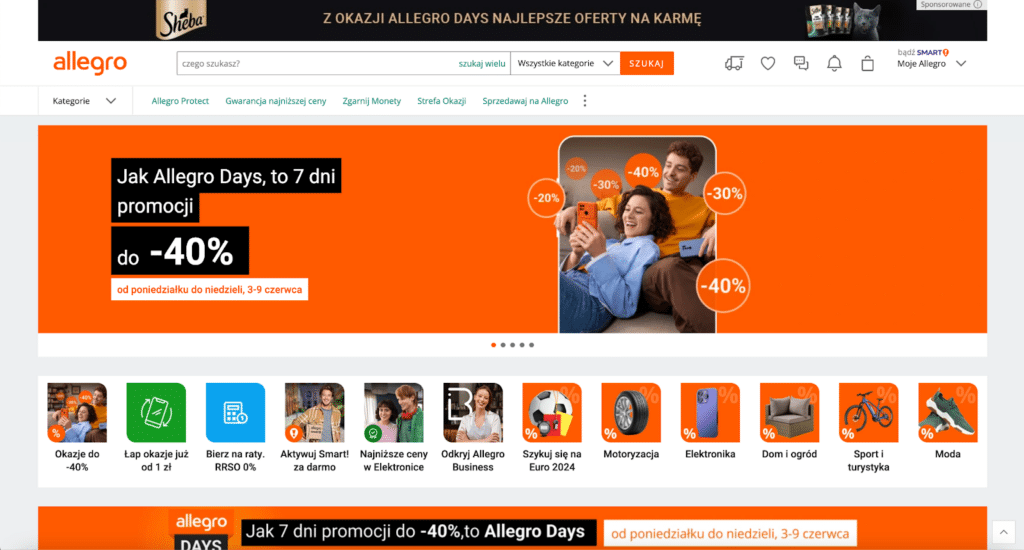
Overview of Allegro
Allegro is the undisputed leader in the Polish ecommerce market, often referred to as the “Polish Amazon.” Established in 1999, Allegro has grown to become the go-to platform for millions of Polish consumers. With a user base exceeding 21 million and over 200 million monthly visits, Allegro offers unparalleled reach and visibility for sellers. Its dominance is reflected in its vast product categories, from electronics and fashion to home goods and automotive parts.
Key features and benefits of Allegro for sellers
One of the key attractions of Allegro for sellers is its massive traffic volume, which translates into higher potential sales. Allegro’s robust customer loyalty programs, such as Allegro Smart!, provide additional incentives for shoppers to return, benefiting sellers with repeat business. The platform’s comprehensive seller support services, including analytics tools, advertising options, and a seamless payment system, further enhance its appeal.
Tips to sell successfully on Allegro
To start selling on Allegro, you need to create a seller account and list your products. Success on Allegro requires optimizing your product listings with high-quality images and detailed descriptions. Leveraging Allegro’s advertising options can boost visibility, while participating in promotional events can attract more buyers. Ensuring excellent customer service and maintaining a high seller rating are crucial for building a positive reputation on the platform.
2. OLX.pl
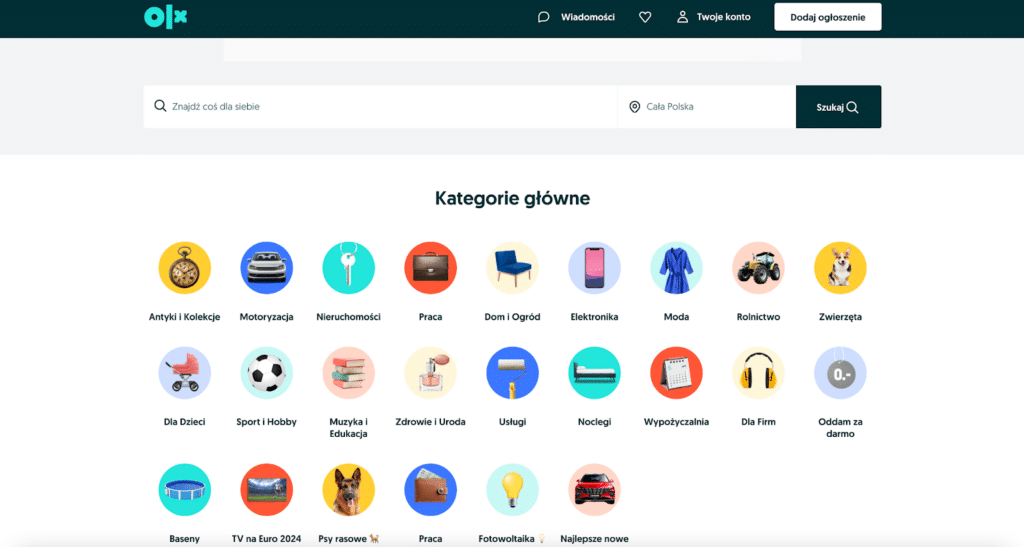
Overview of OLX.pl
OLX.pl is another significant player in the Polish ecommerce market, known for its classified ads model. Unlike traditional ecommerce platforms, OLX.pl focuses on facilitating transactions between individuals for both new and used goods. This makes it a popular choice for a wide range of product categories, including real estate, electronics, fashion, and vehicles. With millions of active users, OLX.pl offers substantial reach for sellers looking to tap into both local and national markets.
Benefits and features of OLX.pl for sellers
One of the primary advantages of OLX.pl is its versatility in accommodating both new and second-hand goods. This flexibility allows sellers to reach a diverse audience, from bargain hunters to those seeking unique or vintage items. The platform’s straightforward listing process and user-friendly interface make it easy for sellers to get started quickly. Additionally, OLX.pl’s local focus can help sellers connect with buyers in their immediate vicinity, facilitating faster and more convenient transactions.
Tips for selling successfully on OLX.pl
Effective selling on OLX.pl starts with creating compelling listings that stand out. High-quality photos and honest, detailed descriptions are essential for attracting buyers. Pricing competitively and being responsive to inquiries can significantly improve your chances of making a sale. For used goods, providing accurate condition details and being transparent about any defects can build trust with potential buyers. Lastly, taking advantage of OLX.pl’s promotional tools can increase the visibility of your listings and drive more traffic to your products.
3. Ceneo
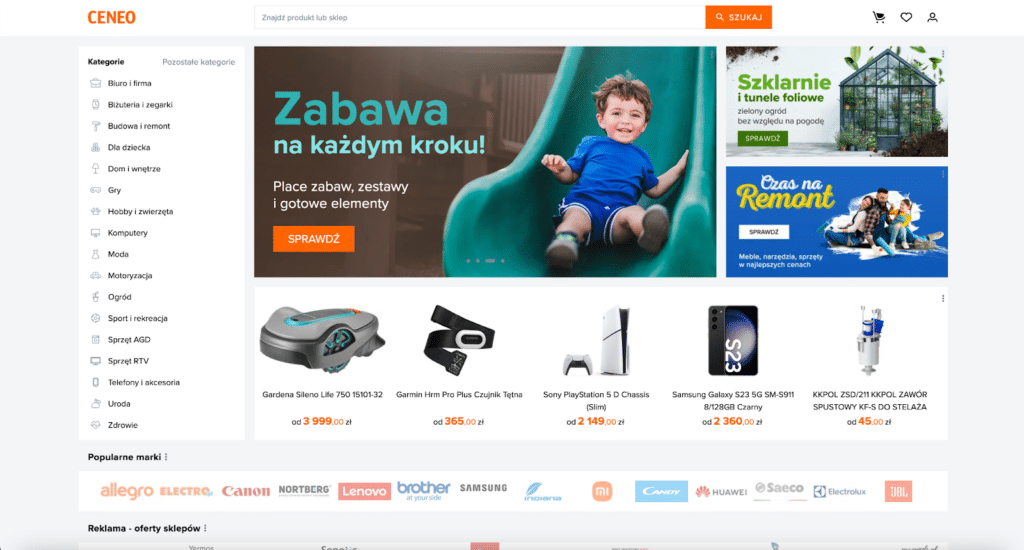
Overview of Ceneo
Ceneo stands out in the Polish ecommerce market as a comprehensive price comparison site that also integrates selling options for businesses. Unlike traditional marketplaces, Ceneo allows consumers to compare prices across a wide range of products from different retailers, helping them find the best deals. This feature makes Ceneo a valuable tool for sellers aiming to reach price-conscious shoppers who are actively seeking the best value for their money.
Features and benefits of Ceneo for sellers
Sellers can leverage Ceneo by listing their products on the platform and ensuring they offer competitive prices. By doing so, they can drive significant traffic to their primary selling platforms, such as their own ecommerce websites or other marketplaces. Utilizing Ceneo’s advertising options, such as sponsored listings, can further enhance visibility and attract more potential buyers. Ensuring that product information is accurate and up-to-date on Ceneo can also help build trust and encourage purchases.
Tips to sell successfully on Ceneo
To optimize for Ceneo, sellers should focus on providing clear and detailed product descriptions, high-quality images, and competitive pricing. It’s important to regularly update listings to reflect current stock levels and prices. Utilizing Ceneo’s analytics tools can help sellers understand consumer behavior and adjust their strategies accordingly. Engaging in active price monitoring and ensuring excellent customer service will further enhance a seller’s reputation and effectiveness on the platform.
4. Morele.net
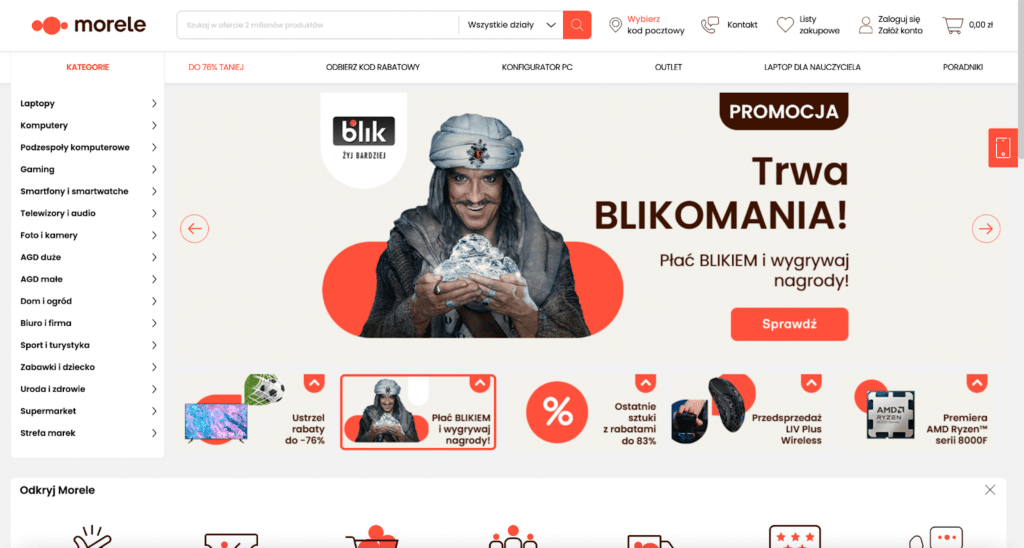
Overview of Morele.net
Morele.net is a specialized marketplace catering to the tech-savvy Polish consumer, focusing primarily on electronics and technology products. Established as a trusted source for everything from computer components and peripherals to household electronics, Morele.net has built a strong reputation among tech enthusiasts. This niche focus allows sellers to target a specific and highly engaged audience.
Benefits and features of Morele.net for sellers
Targeting tech-savvy consumers through Morele.net offers several benefits, including access to a dedicated and knowledgeable customer base that values quality and innovation. Morele.net’s reputation as a go-to marketplace for electronics can enhance a seller’s credibility and increase the likelihood of repeat business. Additionally, the platform’s specialized nature means less competition compared to more general marketplaces, allowing sellers to stand out more easily.
Tips for selling successfully on Morele.net
To succeed on Morele.net, sellers should start by creating a comprehensive and professional seller profile. Listing products with detailed specifications, high-resolution images, and competitive pricing is crucial. Engaging with customers through prompt and helpful responses to inquiries and providing exceptional customer service can foster positive reviews and build a loyal customer base. Utilizing Morele.net’s promotional tools and staying updated with the latest tech trends can also drive more sales and visibility.
5. Empik Marketplace
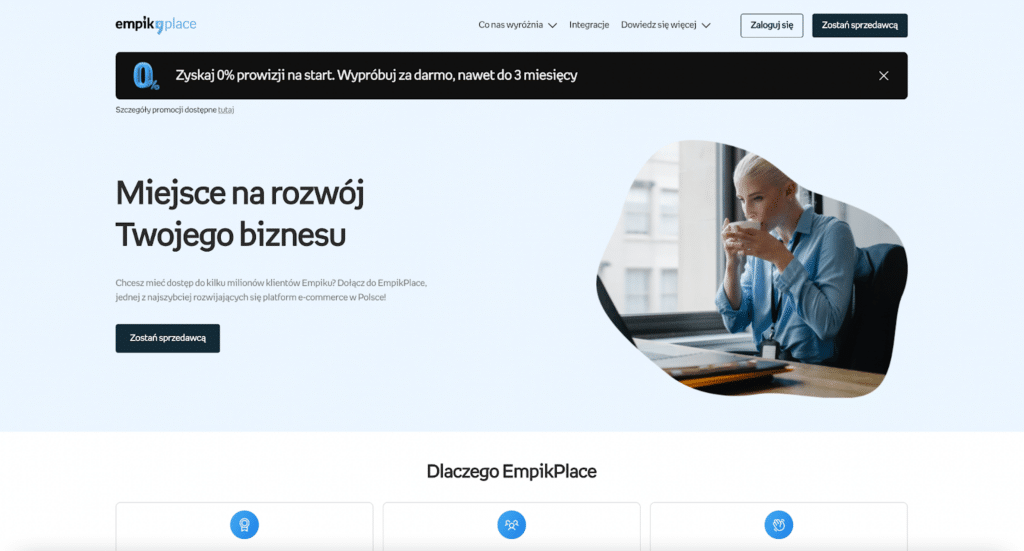
Overview of Empik
Empik Marketplace is renowned in Poland as a central hub for cultural and entertainment products, including books, music, movies, games, and more. With a rich history as a cultural retailer, Empik has expanded its presence online, offering a diverse range of products to a wide audience. This platform is ideal for sellers specializing in cultural and creative goods, providing a targeted marketplace for these items.
Benefits and features of Empik for sellers
To capitalize on Empik’s diverse consumer base, sellers should focus on listing products that align with the platform’s cultural and entertainment focus. Offering a variety of products that cater to different tastes and preferences can attract a broader audience. Participating in Empik’s promotional campaigns and leveraging its advertising tools can increase product visibility. Additionally, understanding the trends and interests of Empik’s user base can help sellers tailor their offerings to meet consumer demands.
Tips for selling successfully on Empik
When listing products on Empik, it’s important to provide detailed and engaging product descriptions, along with high-quality images that capture the essence of the products. Competitive pricing and special offers can attract more buyers. Utilizing keywords effectively in product titles and descriptions can improve search visibility within the marketplace. Finally, maintaining a high level of customer service and engaging with buyers through reviews and feedback can enhance a seller’s reputation and drive more sales.
6. Vinted

Overview of Vinted
Vinted has become a popular platform in Poland for buying and selling pre-owned clothing and accessories. Originating from Lithuania, Vinted has grown into one of Europe’s leading marketplaces for secondhand fashion. Its user-friendly interface and strong community focus have attracted a large number of Polish users who value sustainability and affordable fashion.
Features and benefits of Vinted for sellers
To sell pre-owned fashion effectively on Vinted, it’s important to present your items in the best possible light. Use clear, well-lit photos that showcase the details and condition of your clothing and accessories. Writing honest and detailed descriptions, including any flaws or signs of wear, helps build trust with buyers. Setting competitive prices and being open to negotiation can also increase your chances of making a sale.
Tips for selling successfully on Vinted
Standing out in the competitive Vinted marketplace requires a combination of high-quality listings and proactive engagement with potential buyers. Regularly updating your listings and promoting your items through Vinted’s bumping feature can enhance visibility. Engaging with the Vinted community by responding promptly to messages and providing excellent customer service can also help you build a positive reputation. Additionally, offering bundle deals can encourage larger purchases and improve your sales performance.
7. Eobuwie.pl
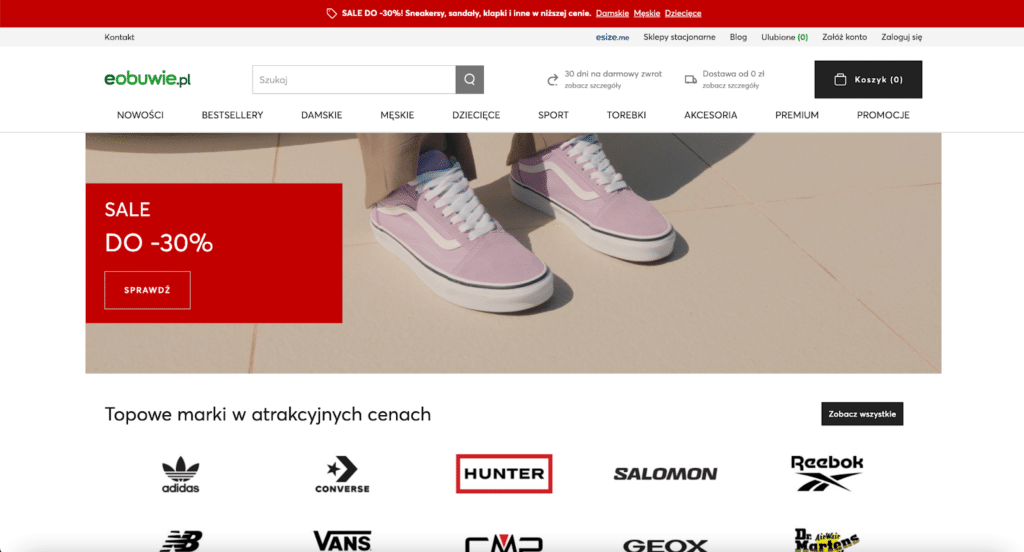
Overview
Eobuwie.pl is a leading Polish ecommerce platform specializing in footwear. Known for its extensive selection of shoes from well-known brands, Eobuwie.pl caters to a wide range of consumer preferences and styles. The platform’s focus on quality and variety has made it a go-to destination for Polish consumers seeking the latest trends and comfortable footwear options.
Benefits and features of Ebuwie.pl for sellers
Niche marketplaces like Eobuwie.pl offer significant advantages for sellers by providing access to a targeted and highly engaged consumer base. These platforms attract shoppers with specific interests, making it easier for sellers to connect with customers who are actively looking for their products. The specialized nature of niche marketplaces also means less competition compared to broader platforms, allowing sellers to stand out more easily.
Tips for selling successfully on Eobuwie.pl
To optimize product listings on Eobuwie.pl, it’s essential to use high-quality images that accurately represent your footwear. Detailed descriptions that include information about materials, sizing, and fit can help buyers make informed decisions. Competitive pricing and regular promotions can attract more customers. Utilizing Eobuwie.pl’s advertising options and participating in seasonal sales events can also boost your visibility and sales. Providing excellent customer service and maintaining a high rating can further enhance your reputation and success on the platform.
How to expand your ecommerce business into Poland successfully
Expanding your ecommerce business into Poland can be a lucrative endeavor if approached strategically. Here are some best practices and tips to ensure a successful expansion:
1. Market research: Conduct thorough research on the Polish market to understand consumer preferences, buying behavior, and competition. Identify the most popular ecommerce platforms and trends relevant to your products.
2. Localization: Adapt your website and marketing materials to the Polish language and culture. Offering customer support in Polish and accepting local payment methods can significantly improve your appeal to Polish consumers.
3. Logistics and fulfillment: Establish a reliable logistics and fulfillment strategy to ensure timely and cost-effective delivery of your products. Partnering with local logistics providers can help streamline this process.
4. Compliance and Regulations: Ensure that your business complies with all local laws and regulations, including those related to taxes, consumer protection, and data privacy. Consulting with legal experts can help navigate these complexities.
5. Marketing and promotion: Leverage digital marketing strategies such as SEO, social media advertising, and influencer partnerships to increase your brand’s visibility in Poland. Tailoring your marketing campaigns to resonate with Polish consumers can drive more traffic and sales.
Expand to Poland with Linnworks
Linnworks can play a crucial role in your expansion into Poland by providing robust ecommerce operations and automation solutions. With Linnworks, you can manage your listings, orders, and inventory across multiple Polish marketplaces from a single platform, simplifying operations and increasing efficiency. This streamlined approach allows you to focus on growing your business and reaching new customers.
Ready to expand your ecommerce business into Poland? Book a demo with Linnworks today and discover how our platform can help you succeed in this dynamic market.
Curious about expanding into additional European markets? Check out your opportunities for cross-border selling in France, Germany and Spain.